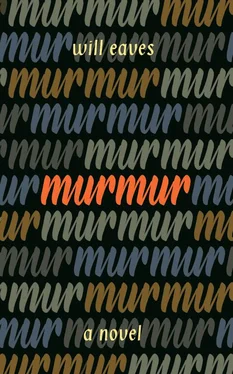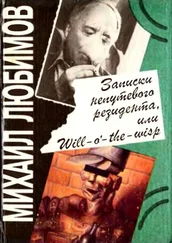The Queen’s hands age. She reaches for the flask of cordial. She pauses, with the foaming beaker halfway to her lips; John waddles to her side. Their comic lineaments begin to sag. Celluloid skin wrinkles, fills in.
The sleeping death, yes, for the apple and Snow White. But before that, the Great Queen brews an elixir of cunning and disguise from elder wood, the bony limbs of a trustworthy tree. It makes her ancient, wise, and just. She comes for Snow White in that guise. She comes for me.
Mother and brother share the draught. They drink.
They put on weight, flesh, comfortable solidity. Within seconds, the woman at the head of the French-polished table, telling June about the vanity mirror (“Italian, you see. Not valuable. But with this rather fetching stand—it was my aunt’s. I couldn’t bear to throw it out.”), is the epitome of taste. She pities June. She talks loudly to quell dislike. John occupies the bay, holding a cup and saucer to his lips. He bows his head and lifts his finger to his moustache, coughs. Says, once, beneath his breath, “Sorry.” June’s back is to the fireplace. She looks across at me. Her color rises with abandonment.
I feel myself outside the room.
I see a lady sitting all alone.
Here is a double strife: the sleeping death of duty—expectation, manners—and the waking inner life.
*
Dear Alec,
I suppose the point of Hamish & co. trailing you everywhere, and asking you about Nomads and secret societies, is the fear that you will be manipulated. Someone is worried you will “talk” to foreign intelligence—an agent got up as a muddled, married ex-fiancée, say—without realizing it. And I can only assume that is why, last week, I received a visit from a pair of gentlemen advising against further telephone communications with Mr. Pryor and asking me a lot of impertinent questions about our friendship. Our new phone, and the one call not to have come from my deaf father—intercepted!
Ours is a party line, of course, and the neighbors could have been listening—only I heard no clicks, so it must have been done professionally, and we said nothing of any value, as far as I am aware. But they caught it all and were very interested in the talk about reflections and the riddle. I’m trying to sound lighthearted, but naturally it has made me anxious. That’s why I am sending this via Max, for hand delivery.
You would have been grimly amused, re the unthinkable, by my conversation with the elder of the two intelligence officers, who began by saying, “We know that you appreciate the sensitive nature of your work for GC&CS,” to which naturally I replied that I didn’t know what he was talking about. We, or rather he, then got swiftly via G. Burgess to a lofty statement concerning individuals at risk of compromise by friends. And I said that if it was Mr. Pryor to whom the gentleman was referring, my understanding of the affair was that you had already been convicted of G.I.—which must surely lessen the risk of “compromise” if not remove it altogether—and that we were mathematical friends only with no record of joint employment, which the officer must know to be true.
If this is intelligence at the higher level these days, Alec, I am not impressed. I said nothing about your patriotic qualities because I did not want to seem to be mounting a defense.
The young man then said, “We have a job to do, Mrs. Wilson. Please answer these questions,” and I asked him who he was. He said that they both worked for MI6, and I inquired how, given the nature of his concerns and the Burgess affair, he could be so sure?
He wanted me to decrypt our conversation about the glass. He felt it might be a keyword for something and I said, no, it was a riddle as all things in dreams are riddles, and that he didn’t seem to understand what he was asking. Deciphering a message makes it intelligible; it doesn’t tell you what it means.
Well, I saw no reason not to tell him what a competent analyst of the forms and shapes would have gleaned from our call—that in this instance the oval scrying glass was clearly a concave mirror; that your brother John appeared as a dwarf because he stood beyond the center of curvature, in the back of the room, and that I had a self-image superimposed on me because I was at the center of curvature, and so on.
As to what that means, well, I don’t know and neither do you. That’s why we were talking and laughing about it.
And he said, “I think you do know what it means, Mrs. Wilson, or will do, and when you do, we’d like to hear from you.” It sent shivers down my spine, I must say. Then he asked me about the lady sitting all alone, and I’m afraid once again I was at a loss. In fact, I was upset, because it needs no great feat of interpretation to sense the powerful emotion in your hallucinations, and in that respect I feel for us both. We have both lost someone, haven’t we?
Bill later filled in the blanks of the lone lady. You were remembering an old English riddle, the sort of thing Dilly went in for. “I saw a lady sitting all alone.” That’s all there is of it and it remains unsolved. Except that Bill has suggested a solution. He says it is quite obvious once you see it. The answer is “Mirror”—the one who watches and reflects.
Really the most unthinkable part of what you told me was the business of imagining me hatless at your mother’s. As if I’d have dared. I seem to remember she and I were both very civil. Her pride in you was a bit of a force field, of course. The most striking thing was that she couldn’t find anything to ask me. When we were in the garden, she pointed at the flowers in turn and gave me their Latin names. And when she’d done that, she blurted out in a sort of panic: “As a little boy, Alec made his own pens.” Anyway, I think your somewhat distrait image of me must be an homage to self—I am partly you in dreams and so more likely to forget a hat.
But we must meet: this keeping up of merely affable appearances is hard, when there is so much at stake for you. Max and Lyn bring news, of course, but it isn’t the same. I miss you.
We could meet in King’s—in Gibbs’?
What has your Dr. Stallbrook made of the cartoons? I expect he will say they point to some inability to countenance reality, etc., but I think there is more to it than that. Snow White is a detailed work of art, and the thing about that kind of creation must be that it is only ever painstakingly achieved, and yet always a surprise, which is the essence of cryptanalysis, after all, and of the work we did. I think it is also clearly the lesson of caring about anyone.
Better not call again: I do not like the idea of being “cut off.” And be of good cheer: the anxiety of your pursuers will abate. They will find others of more concern to them. For now, though, honi soit and let your virtue continue to shine.
Love, June
PS So good to hear your voice. You sounded physically whole—revived? Resigned? Phones very good for scrying . I can picture you, however far away!
As soon as one can see the cause and effect working themselves out in the brain, one regards it as not being thinking, but a sort of unimaginative donkey-work. From this point of view one might be tempted to define thinking as consisting of ‘those mental processes that we don’t understand’. If this is right then to make a thinking machine is to make one which does interesting things without our really understanding quite how it is done.
—A. M. Turing, “Can Automatic Calculating Machines Be Said to Think?” (1952)
Dear June,
Well, we shall avoid the telephone and trust to the post, although I am not convinced that it makes much difference. My letters are certainly being read: the postbox is just over the way and I can see the man rummaging about in the bag that he takes away with him. You were kind to tax the intelligence officers with the illogic of their suspicions, in defense of my honor, but you were being too subtle. I am now a nuisance. Having been identified as one kind of sexual menace, I am as liable to be another political sort, I suppose.
Читать дальше












